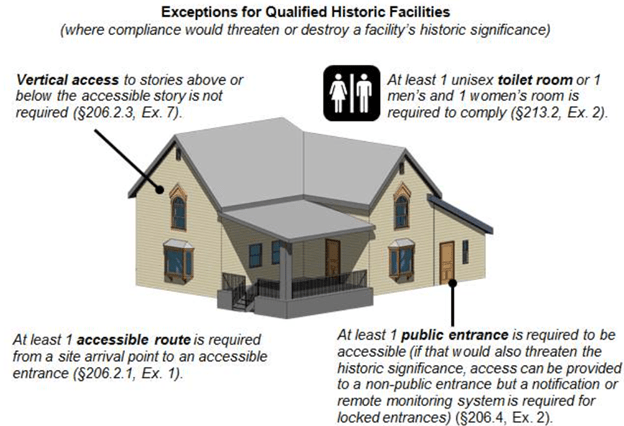The ADA Standards contain exceptions for qualified historic facilities when alterations to these types of facilities could threaten or destroy the historical significance of the building or facility. The exceptions include accessible routes, entrances, and toilet rooms. Alternate means of access are permitted if it is found that an alteration would threaten or destroy the historical significance.
The specific exceptions include the following:
- Vertical access is not required to any floor other than the main floor.
- At least one accessible public entrance into the facility is required. Additional entrances are not required to be accessible.
- If restrooms are provided within the facility for public use, then at least one unisex toilet room or one men’s and one women’s restroom is required to be accessible and located on an accessible route. Any additional restrooms provided within the facility are not required to be accessible. As with most elements covered by the ADA, if a restroom is not provided at all then there is no requirement to provide an accessible restroom.
- At least one accessible route is required to the accessible entrance.

When an entity believes that an alteration to provide accessibility would threaten or destroy the historical significance of the building or facility, or when they believe that an alteration would be technically infeasible, they should consult with their State Historic Preservation Office or the Advisory Council on Historic Preservation to discuss the specific situation. Only if the State Historic Preservation Officer or the Advisory Council agrees with the entity’s assessment can the exception of not completing the alteration be used. In this case, the entity should explore other ways to provide access to the facility, such as a video-guided tour of the area of the facility that cannot be accessed or relocating interesting artifacts to an accessible location. These types of decisions and any communication from outside consultants should be documented and filed in case there are any questions about why or who made these decisions.
ACP has extensive experience assessing qualified historic buildings and facilities using the exceptions provided within the ADA Standards and would love to consult with you on ways to ensure everyone’s access to your historic building or facility.
